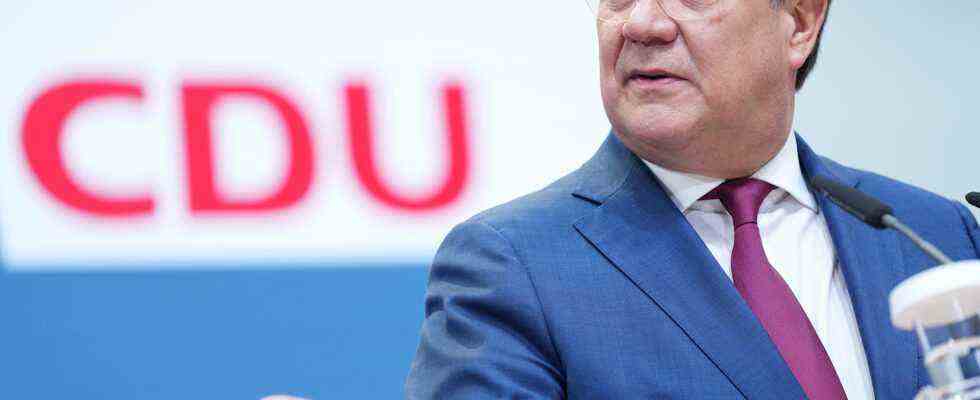analysis
Status: 01/21/2022 06:42 a.m
First CDU boss, then Chancellor – that was Laschet’s plan. Now the former Prime Minister of North Rhine-Westphalia has the second row in the Bundestag. How could that happen?
Armin Laschet was able to celebrate the high point of his short national political career right at the beginning. At the digital party conference over a year ago, on January 16, 2021, he gave a convincing speech. He presents himself as a team captain “who leads and brings together”.
Laschet then steps next to the lectern with his father’s brass-colored miner’s mark in his hand and courts the delegates’ trust. At that time with success, he narrowly prevailed against Friedrich Merz. The CDU is in polls at 35 percent, the SPD far behind at 14 percent. The Merkel successor seems to be going according to plan.
First party chairmanship, then chancellor candidacy
On the way to power, Laschet wants to follow the classic CDU plan: first get the party chairmanship, then claim the candidacy for chancellor. But there are doubts in the Union, because the personal poll numbers for Laschet remain consistently bad in the new office. His relaxed pandemic course is not well received by the population, and Markus Söder feels on the upswing. The CSU boss also has ambitions for the chancellor candidacy, even if he keeps a low profile for a long time. While the SPD has long nominated a candidate for the chancellorship in Olaf Scholz, there is a power vacuum in the Union.
Laschet or Söder – the showdown
In mid-April 2021, Laschet has already been in office for three months, but he does not yet have the chancellor candidacy firmly in place. Instead, two party leaders are now claiming the chancellor candidacy, and the party leaders of the CDU and CSU are backing the respective leaders. Laschet and Söder have to go to the parliamentary group together for the showdown, which is meeting in the plenary hall of the Bundestag because of Corona. Many CDU MPs are in favor of Söder as a candidate for chancellor. Laschet is battered, but he doesn’t budge.
The decision will then be made on April 20, around five months before the general election. The CDU federal executive nominates Laschet with a large majority as the Union’s candidate for chancellor.
But the brutal power struggle left its mark and damaged the candidate before the election campaign even got underway. The voters would have honored unity, says Laschet afterwards with a view to the SPD and its candidate Scholz. There they left the internal party struggle for the party chairmanship before the federal election campaign behind and supported Scholz together. Conversely, this means that Laschet missed this broad support from the Union.
The mistakes of Armin Laschet
But it is also true that Laschet made mistakes himself. He consistently ignored his bad personal poll numbers. His laughter in the flood area was a communicative disaster and gave his election campaign the rest. In addition, the Union campaign, which started late, lacked the time and the basic strategic orientation to be successful. While the SPD promoted a minimum wage of twelve euros and stable pensions, Laschet’s messages were arbitrary and interchangeable. The candidate himself and the party remained profileless. Laschet’s business as usual did not catch on with the voters.
After the election debacle
In retrospect, one has to give Laschet credit for not simply throwing in the Union’s historically worst election result – regardless of calls for his resignation as party leader. After the failed exploratory talks with the FDP and the Greens, he didn’t torpedo the way to a new traffic light government any further. It was important to him that the change of government “takes place in a democratic style,” he says afterwards.
Laschet no longer influenced his successor process in his own party either. Laschet appreciates his successor Merz, despite different views. Because he was always loyal – even in difficult phases.
He sees it as a success that, after his short term in office, everyone in the CDU is talking about the breadth and center of the party. That was not the case a year ago. Merz also apparently recognized that he has a chance as CDU leader if he can gather as many currents and women as possible behind him.
Still party leader Laschet will withdraw from the party leadership on Saturday. Then he is just a simple opposition MP who takes care of Russia and Turkey policy for his group in the foreign affairs committee. After a year of ups and downs, that doesn’t seem to bother him anymore. It cannot be changed, the result is as it is and now it has to go on, says Laschet. After all, he did not run for the Bundestag to draw a line, but to make a difference.
The rise and fall of Armin Laschet
Uli Hauck, ARD Berlin, January 21, 2022 6:56 a.m

